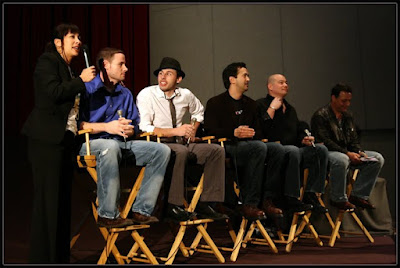
REVIEW: ‘The Sensei’
By Albert Valentin | Published March 21, 2010
Very rarely does a martial arts film tend to be emotional in the vein of bringing out a positive message. While films like THE KARATE KID (1984) and BEST OF THE BEST (1989) bring out a message about self defense and teamwork, this 2008 martial arts drama gives a positive message about civil rights and the courage to fight for who you are during the 1980’s.
The “sensei” of the title is a woman named Karen O’Neill, played by writer/director Diana Lee Inosanto. A Japanese-Filipino-American, she returns to her hometown of Summersfield after a falling out with her family over her rank as a black belt martial artist. She has made amends with most of her family, with the exception of her brother Simon (Tim Lounibos), who still feels she has somehow disgraced the family with her rebellious attitude.
Meanwhile, McClane Evans (Mike O’Laskey), a teenager has been pratically ousted by everyone around with the exception of few because he is a gay teenager who lost his best friend. Feeling conflict not only with local bullies but himself as well, an incident after gym class leaves McClane in the hospital. McClane’s mother Annie (Gina Scalzi) asks for Karen’s help in teaching McClane self-defense. At first, Karen is reluctant, but she eventually takes him in as a student.
McClane and Karen not only become master-student, but friends who possess something in common: the loss of a loved one. When McClane finally stands up to the lead bully who was responsible for his hospitalization, word breaks of Karen’s teaching McClane. It is not long before Karen’s family begins to feel the pressure and get ousted by the townsfolk. However, a shocking revelation may prove to be a factor that not only brings Karen and McClane closer but Karen and her family as well.
The film was set during a time where the AIDS epidemic was on a high rise and people came under the generalization that only homosexual people were akin to the disease. For writer/director/star Diana Lee Inosanto, it was a chance to bring a positive message to break the stereotypical banner while showing that she has the ability to film a martial arts drama. According to Inosanto, the film was influenced by the murder of teen Matthew Sheperd in 1998 as well as the coming out of her cousin and it took seven years to get the project off the ground. The final result is truly worth the wait.
The daughter of Filipino martial arts legend and Bruce Lee student Dan Inosanto, Diana definitely has some martials arts skills and possesses some really good dramatic skills as well. While she has the makings of a talented independent director, she could still brush up a little on her screenwriting in terms of its dialogue. There are times when it seems there is some unnecessary foul language. Maybe it is because she is trying to display the behavior of teens in that era or perhaps, it posed as a set up for the action scenes.
The student, McClane Evans, is played by Mike O’Laskey, perhaps best known for his role as Colt in 3 NINJAS: HIGH NOON AT MEGA MOUNTAIN (1998). A martial artist himself with black belts in Karate and Tae Kwon Do, O’Laskey was able to adapt well when it comes to on-screen fighting, especially in the few big fight scenes he has in the film. O’Laskey also does a good job in the dramatic department as a teen whose sexual orientation makes him an outcast, but also a victim of bullies.
What stands out is the relationship between Karen and McClane. Reminiscent of THE KARATE KID’s Daniel and Miyagi, Karen and McClane soon feel a deeper bond when a major incident reveals a shocking twist to the film. McClane at one point tells Karen that he wished he had met her sooner before the tragedy that fell upon him. Like many friendships, Karen and McClane hit a few bumps but they stick it out until the very end.
Veterans Sab Shimono (TEENAGE MUTANT NINJA TURTLES III) and Emily Kuroda (YELLOW) play Karen’s grandparents, who feel they are at the center of the conflict that emerges between Karen, McClane, and the townsfolk. Despite having top billing for the most part, Keith David (THE FIFTH COMMANDMENT) and Louis Mandylor (MARTIAL LAW) have mainly cameo appearances as a minister and Karen’s ex-fiance, a boxing champion who goes through a very tragic experience. Even martial artist extraordinare Erik Betts brings in a non-action role as a very influential character in Karen’s life as is RUSH HOUR’s Tzi Ma as a Buddhist priest who teaches Karen a life lesson in a memorable flashback.
Inosanto’s husband, martial artist Ron Balicki, did well as the film’s stunt coordinator and fight choreographer. O’Laskey and Inosanto shine when combining Jeet Kune Do, Filipino Kali, and Jujitsu. O’Laskey even gets to add a little taste of Muay Thai and in a demonstration scene, a little bit of perhaps either XMA (Extreme Martial Arts) or Capoeira. There is plenty of blood but not in the vein of NINJA ASSASSIN (2009) but enough to show injuries and even a subliminal sense of sodomy during McClane’s assault. Nevertheless, like BEST OF THE BEST, there are few action scenes but they were well done and shot with minimal quick cuts and close ups.
THE SENSEI is truly an emotional martial arts drama, one that truly needs to be seen because of its positive message of civil rights as well as seeing a future star and filmmaker in the form of Diana Lee Inosanto. Should she decide to do another film, one only hopes she can belt out something as great as this film which can bring someone to tears once they get into the film.
REVIEW







